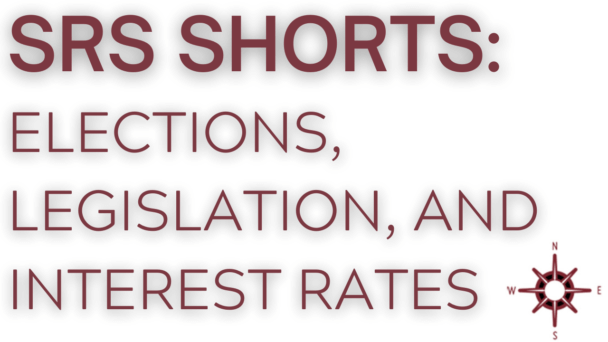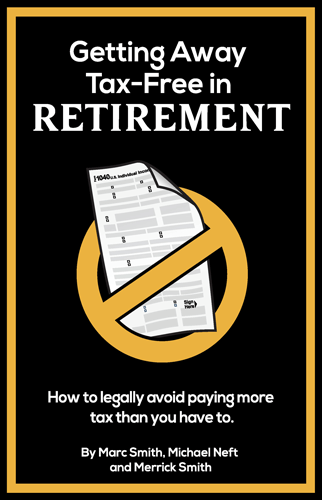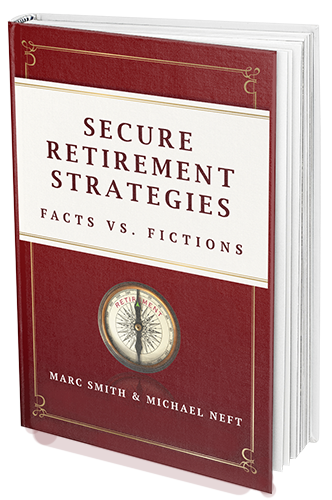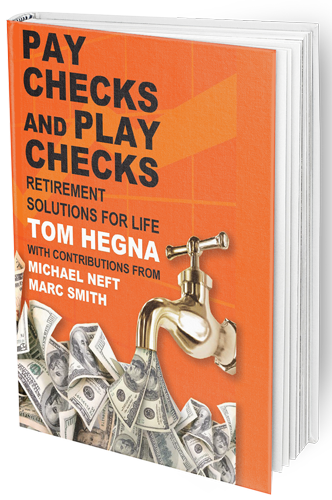Elections, Legislation, and Interest Rates
At SRS, not only do we pride ourselves on helping you chart a course for long term investment strategy, we also take diligent care to stay current with market climates with regard to federal and state policy changes.
Take a look at the below video to hear from Merrick Smith and Michael Neft, partners here at the firm.
They share their thoughts and outlook on current and potential future happenings as they relate to interest rates, election cycles, and how those things might affect the markets.
Transcript:
Merrick: Hi, this is Merrick Smith. I’m one of the managing partners here at Secure Retirement. I’m also joined here with my partner, Michael Neft.
Michael: Hi, everybody.
Merrick: We’d like to talk to you today about current events that will affect you short term and long term, some of that being legislation that might be passed here. In the short interim.
Merrick: We also wanna talk though, like I said, about current market events, such as inflation, such as interest rates, things that affect you right here and now.
Michael: Hey Merrick, why don’t we talk about midterm elections first and kind of work our way back, because that may really interest a lot of people and at least, you know, we can use our past history and knowledge to tell people what we think will happen.
Merrick: Yeah, and Mike, based off of past history, as we go into the midterms, what do you think’s gonna happen?
Michael: Well, and please remember, this is just my opinion. I’ve seen it once or twice in my lifetime, but typically whenever a new party takes over and the Biden administration and the Democrats took over and they won both houses.
Michael: So they control the white house. They control the Senate and they control the House of Representatives. And in a midterm election, typically there’s a little bit of a shift and what we think is gonna happen, and once again, this is just based upon what we read, what we hear and what we’ve seen in the past.
Michael: We believe that the Democrats are going to most likely lose one of the houses, probably the House of Representatives. They may lose the Senate as well, too, but that’s always a tougher call, but actually if they just lose the House of Representatives, excuse me for the markets. That’s gonna be a very good thing.
Michael: Why? Because it creates gridlock.
Merrick: Gridlock is always good for the markets. If you look back past history, gridlock is usually a good thing for the markets. Yeah.
Michael: What happens with gridlock?
Merrick: Nothing gets done. Nothing, nothing gets done and things go along.
Michael: And the markets love nothing happening in Washington because when there’s gridlock, the people who are investors, the traders, the long term buyers, they see neither of the moronic parties that are in power are gonna pass some crazy bill.
Michael: That’s gonna affect the small guy, the little investor. And so most investors feel nothing happens because nothing gets passed and that’s great. We love gridlock.
Merrick: Now, when it comes to inflation, Mike inflation is a, a pain that everybody feels. Young people with families, older people that are in a different phase of life that don’t have that income, that they once had people that are looking to retire and step into that next phase of life.
Merrick: Inflation’s been a major problem over the last year.
Michael: It has been, and we’ve sort of forgotten about it because for years we were told inflation is benign. Well, whether it was benign or not, it’s here now. And unfortunately it’s that unseen, unheralded tax that everybody pays in a way of just paying more for each of the goods that we’re buying.
Michael: And the government says inflation is calculated as food and energy. Now think about that for just a second. We need to eat every day of our lives to live.
Michael: And most of us commute in one way or another to work, to wherever. We need fuel. And whether it be green energy fuel, whether it be electricity, whether it be gasoline, we need those to power vehicles and the cost of that going up, whether it’s an airplane, whether it’s a train, whether it’s a car and even if you have an electronic vehicle, you still have to plug it in somewhere.
Michael: There still is energy needs there too, which costs are going up. And how high do you think inflation’s gonna go? Because that’s what really, everybody wants to hear. How is this gonna affect me? Not only today, six months from now, 12 months from now. Does it, what do you think Merrick, does the picture look good?
Merrick: I think inflation, if you look over the last 30 days at commodities and different sectors, the numbers have actually been promising. Things have been coming down. So in the short interim, I think things actually look favorable.
Merrick: The consumer price index year over year is at about 9.1%.
Michael: Right.
Merrick: That’s how they rate consumer goods and how much that price has gone up or gone down year over year.
Michael: And typically the CPI or the consumer price index anywhere from one and a half to two and a half is pretty acceptable.
Merrick: Correct.
Merrick: We’ve came to live with that. And everybody’s good. So, you know, what you’re saying is that it’s kind of quadrupled
Merrick: Correct.
Michael: That hurts.
Merrick: And that’s something that’s not easy to curb overnight. Yeah. It seems like as far as rates and interest rates, it seems like the fed is committed to raising rates here in September, at least a half a point past that. What do you think the forecast is?
Michael: I think you’re right. They are committed and I think a good sign will be, if they raise rates by half a percent, 50 basis points, that would be a signal to the market that the fed has inflation under control. And I think that would be a good stimulus for the market. We’re almost counting upon that. If the fed goes 75 basis points, or God forbid one full percent, that would be a sign that the economy is not improving.
Michael: I think that’s not gonna happen. I think you’re correct, but that’s the two scenarios. We hope we look for anything less than, you know, 50 basis points or less anything more than that I think could be kind of bearish.
Merrick: Correct, correct. I agree with you. There’s some current events that are coming up. We have on Friday, tomorrow, the job reports come out.
Merrick: You’ll see here with some legislation that’s going on. There might be some big spending down the pipeline in the short interim. So we’ll see what happens there. But if the fed, if the government here decides to put another 700 billion dollars on the credit card that could be something that, that hurts inflation in the momentum that we’ve had here in the last 30 days.
Merrick: So we will see what happens in the future.
Michael: And you know, and here’s something that doesn’t get spoken about very much, but when interest rates go higher, you, I, our clients, anybody who’s listening, it’s gonna cost you more to borrow. But the government, the federal government, who’s printing this money all the time through treasury bills, treasury notes, treasury bonds, they’re borrowing as well too, and the cost of borrowing just adds to the federal deficit.
Michael: And by increasing that federal deficit and, and for you or I it’s monopoly money, the trillions of dollars that they have to pay or are obligated to pay, maybe hopefully. The interest to carry those loads or that debt on the bonds that they have outstanding, that increases. And it costs the government more and it becomes kind of like a snowball going downhill, gaining momentum.
Michael: It just keeps getting bigger and bigger. And we don’t wanna see that. So we hope interest rates are gonna start trending downward because all of these things kind of make it harder for the government to do business. And unfortunately for you or I, we have debt. We have to pay it off. We can’t only reach a certain point where we can’t borrow anymore.
Michael: Our federal government prints money when they need it. And they just increase the deficit. That’s not the way to grow the economy, that affects everything else. So we hope interest rates come down because we want it to cost us less to borrow. We also want the government to pay less to borrow too.
Merrick: Yeah. So hopefully here in, in the next year we see the government really get control here over inflation. Like we said, if interest rates here in September only go up half a percentage point, that’ll show that there’s some confidence here in what they’ve done over the last few months. Thank you very much for, for joining us.
Merrick: And we look forward to speaking with you. Very soon here.








